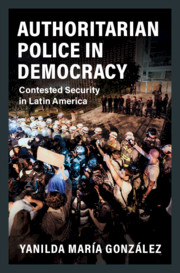Book contents
- Authoritarian Police in Democracy
- Cambridge Studies in Comparative Politics
- Authoritarian Police in Democracy
- Copyright page
- Contents
- Figures
- Tables
- Acknowledgments
- 1 Police
- 2 Ordinary Democratic Politics and the Challenge of Police Reform
- Part I Persistence
- Part II Reform
- References
- Index
- Other Books in the Series (Continued from page ii)
1 - Police
Authoritarian Enclaves in Democratic States
Published online by Cambridge University Press: 30 October 2020
- Authoritarian Police in Democracy
- Cambridge Studies in Comparative Politics
- Authoritarian Police in Democracy
- Copyright page
- Contents
- Figures
- Tables
- Acknowledgments
- 1 Police
- 2 Ordinary Democratic Politics and the Challenge of Police Reform
- Part I Persistence
- Part II Reform
- References
- Index
- Other Books in the Series (Continued from page ii)
Summary
Chapter 1 develops a theoretical framework for understanding the persistence of police forces as authoritarian enclaves in democracies, distinguishing between authoritarian and democratic coercion. Under authoritarian rule, the primary purpose of coercion is to keep the leader in power, and it is deployed with few constraints. In democracies, where governments must place checks on their own power, coercion ought to be deployed primarily to provide security for the citizenry rather than to serve the interests of the leader, constrained by the rule of law, and subject to external accountability. I disaggregate coercion along three dimensions: the extent to which coercion is governed by law or is applied arbitrarily; the strength of external accountability mechanisms; and whether coercion primarily serves leaders’ interests or to protect citizens. I demonstrate that police reform to promote democratic coercion has been relatively rare in democratic Latin America, even as rising crime and violence made security a salient electoral issue. I assess the problem posed by the endurance of authoritarian coercion for democracies and situate this institutional persistence within the structural power of the police, which leads politicians to engage in accommodation with the police, an exchange relationship that creates entrenched interests that favor institutional persistence.
Keywords
- Type
- Chapter
- Information
- Authoritarian Police in DemocracyContested Security in Latin America, pp. 1 - 26Publisher: Cambridge University PressPrint publication year: 2020

